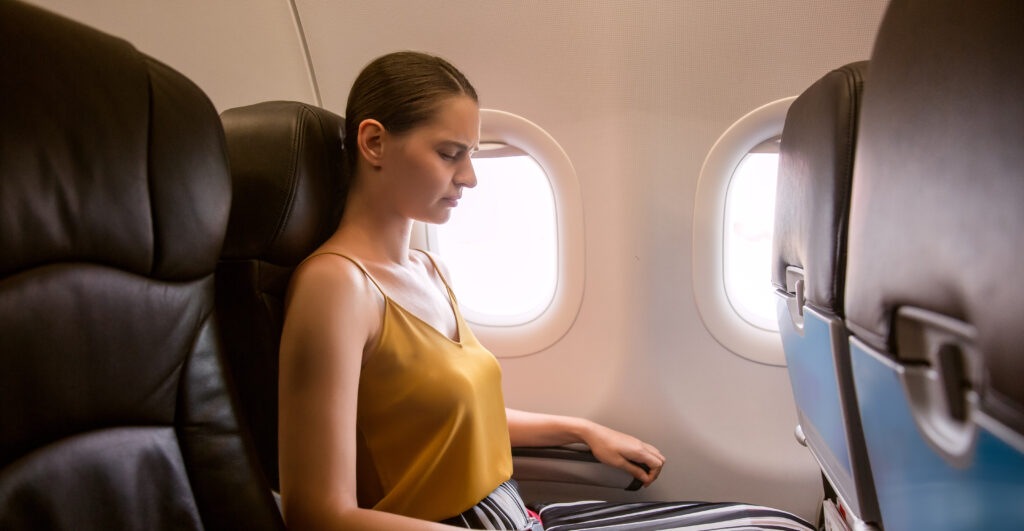In recent weeks, news of multiple plane crashes has dominated headlines, leaving many people feeling uneasy about flying. If you’re experiencing heightened stress, fear, or anxiety surrounding air travel, you’re not alone. While the headlines can be alarming, it’s essential to keep things in perspective and ease flying anxiety effectively.
The reality is that flying remains one of the safest modes of transportation. Every day, tens of thousands of flights take off and land safely, but these success stories don’t make the news. Instead, rare incidents—though tragic—become highly publicized, which can distort our perception of risk.
For those struggling with travel anxiety, especially amid the recent surge in unsettling aviation news, it’s crucial to have strategies for managing fear. Whether you’re flying solo, traveling with a partner, or supporting a loved one who is anxious about flying, here are research-backed ways to navigate this stress while strengthening your relationships.
Understanding the Psychological Impact of Fear-Based News
The Gottman Method, developed by renowned relationship researchers Drs. John and Julie Gottman, emphasizes the role of emotional regulation and perspective-taking in maintaining healthy relationships. When we are bombarded with negative news, our bodies go into a heightened state of alert, triggering our fight-or-flight response—even when there is no immediate danger.
This response can be particularly challenging for people prone to anxiety or who have had past traumatic experiences related to travel. Furthermore, fear can strain relationships, as one partner may downplay the other’s concerns, leading to feelings of dismissal or invalidation.

Strategies for Coping with Flying Anxiety
1. Keep Perspective in Check
While it’s natural to feel anxious after reading about multiple plane incidents, it’s important to remember that flying is still one of the safest forms of travel. According to the Federal Aviation Administration (FAA), millions of passengers fly every day without incident. When fear takes hold, remind yourself of the facts:
- The overwhelming majority of flights operate safely.
- Pilots, air traffic controllers, and aviation professionals undergo rigorous training to ensure passenger safety.
- The aviation industry constantly evolves to improve safety protocols.
Try shifting your mindset: Instead of focusing on “what if something goes wrong?” reframe it to “what if everything goes right?”
2. Use the Gottman “Self-Soothing” Technique
In the Gottman Method, self-soothing is a key strategy for managing heightened emotions. When anxiety spikes before or during a flight, practice the following:
- Deep breathing: Inhale for four seconds, hold for four seconds, exhale for four seconds.
- Progressive muscle relaxation: Tense and then slowly relax each muscle group in your body.
- Visualization: Picture yourself safely arriving at your destination, enjoying your trip, and returning home with positive memories.
Encourage your partner to support your self-soothing practices by being a calming presence rather than trying to “fix” your fear.
3. Use Emotional Bids to Strengthen Connection
A “bid for connection” is a term used in the Gottman Method to describe an attempt to seek attention, affirmation, or support from a partner. If your fear of flying is causing stress, communicate your emotions clearly and ask for the kind of support you need.
For example, instead of saying:
🔴 “You don’t understand how scary this is!”
Try:
🟢 “I’m feeling really anxious about our upcoming flight. Can we talk about ways to make it easier for me?”
Encouraging your partner to respond with empathy rather than logic (e.g., “Statistically, it’s safe” vs. “I know this is hard for you, and I’m here for you”) can make all the difference in how you process your fear.

4. Reduce Media Consumption Before a Flight
San Diego is a city of travelers—whether it’s for business, leisure, or visiting family, air travel is a major part of life. However, constantly consuming news about rare aviation mishaps can create a distorted sense of danger.
If you’re preparing for a trip, consider:
✅ Limiting news and social media consumption about airline incidents.
✅ Distracting yourself with travel planning, books, or relaxation techniques.
✅ Focusing on the excitement of your destination rather than the flight itself.
5. Practice a Pre-Flight Ritual
Establishing a calming routine before a flight can help anchor you in familiarity. This might include:
- Listening to calming music or a guided meditation.
- Reading a book to divert attention.
- Repeating affirmations such as: “I am safe. I trust the professionals guiding this flight.”
For couples, turning this into a shared routine—such as holding hands during takeoff or watching a favorite show on the plane—can create a sense of security.

Final Thoughts: Prioritizing Emotional Well-Being While Traveling
While fear surrounding recent aviation events is understandable, it’s essential to maintain a balanced perspective. The reason these incidents make headlines is precisely because they are rare. The vast majority of flights arrive safely every day, and airline safety measures continue to evolve to protect passengers.
By focusing on self-soothing, emotional regulation, and connection with loved ones, you can navigate flying anxiety with greater ease. Whether you’re traveling for work, leisure, or a romantic getaway, remember: your emotional well-being matters as much as your physical safety.
If you’re struggling with fear or relationship stress related to flying, our team at The Relationship Place is here to support you. Reach out to us for a consultation and take the first step toward stress-free travel.

